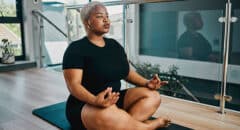 Not long ago I viewed a YouTube video entitled, “Black Folks Don't Go to Therapy.” How could that be true when I know otherwise? As a practicing psychologist I work primarily with racial and ethnic minorities and many of them are in fact Black. I have come to realize that, yes, Black folks do go to therapy. However, what is more accurate is that Black folks do go to therapy with someone they feel they can trust and that has their best interest at heart.
Not long ago I viewed a YouTube video entitled, “Black Folks Don't Go to Therapy.” How could that be true when I know otherwise? As a practicing psychologist I work primarily with racial and ethnic minorities and many of them are in fact Black. I have come to realize that, yes, Black folks do go to therapy. However, what is more accurate is that Black folks do go to therapy with someone they feel they can trust and that has their best interest at heart.
READ: Darryl "DMC" McDaniels Reveals Suicide Attempts: "Therapy Is Gangsta"
It is true that the field of psychology, much like the medical system and pretty much any other institution of “care,” has explicitly and implicitly harmed people of color. Misdiagnosis, premature use of psychiatric medication, unnecessary psychiatric hospitalizations, and ineffective therapeutic care is a real reality for Black folks and one that I dare not take lightly. These realistic concerns far too often serve as barriers to seeking help.
Many researchers have identified stigma, lack of knowledge, lack of affordability, lack of trust, impersonal service, self-consciousness, age, social class, and lack of cultural understanding as primary factors that impact Black individuals attitudes about seeking. This poses the question, how can Black folks get beyond these legitimate barriers to get the support they deserve in an effective and culturally competent manner?
The following outlines a few strategies for those interested in seeking mental and emotional support:
Looking for more mental health resources? Find what you need here.
Before the first session: Engage in a little self evaluation. What kind of support do you need? What patterns are you noticing in your life that cause you distress? What are your "symptoms"? How do you feel about seeking counseling/therapy? What kind of counselor/therapist do you want? Take some time to get recommendations from trusted friends or research on the Internet for providers in your area. Generally, there are profiles listed that offer you a picture of the provider, a summary of their therapeutic style, format and cost of their services. Be picky. Determine the characteristics needed in a provider that will help you to feel most vulnerable and safe.
During the first session: Given the history of mistreatment and cultural mistrust, it’s perfectly acceptable to be cautious although you must know that a provider’s job is to ask questions or get all up in your business in an effort to provide you the best support. Simply be honest. Tell the provider how you feel. Nervous, apprehensive, scared, excited, desperate, etc.
READ: Breaking The Taboo of Selfishness: The Case for Self Care
Feel free to tell the provider what aspects of your identity are most important to you and to inquire as to who they are. If it is important to you, feel free to ask the counselor/therapist if diversity and multiculturalism is a part of their therapy and how so. If this is important to you, ask your counselor/therapist what their perspective is on diagnosis and medication.
READ: Double Dutch Used As Therapy
These questions not only serve you but the provider as well. Much like any other relationship, it's important to see if you two are compatible and if there is a good fit. Some common signs of therapeutic safety include:
- Are you comfortable with the provider’s office setting/ambiance? Does it feel inviting to you?
- Does the provider appear comfortable with cultural or racialized language? Ex: Asking you explicitly in paperwork or verbally about the identities that matter to you or using terms such as culture or diversity or even oppression and discrimination vs. dancing around topics or being too politically correct.
- Do you feel your provider is being genuine and honest?
- Does the providers style of therapy make you feel safe?
- Is the provider open to sharing information about him/herself?
- Is the provider flexible with their protocol or therapeutic process to ensure your safety and comfort? If not, are they transparent about why? Sometimes there are ethical or legal parameters that prevent them from being most flexible but a willingness to discuss this is telling.
Following the first session: Now is time for reflection. What did you like about the counselor and what didn’t you like? Do you feel connected to your provider and genuinely believe that they understand you and have your best interest at heart? Some studies have indicated that race matching is critical for therapeutic effectiveness while others state that it’s not a critical factor. Almost universally we know that depending on one’s racial identity development status, race matching will impact if you feel more connected, engaged, or open to the process of therapy. It's natural to assume that this could increase the effectiveness of the therapy.
Always attend the follow up session. Even if you decide not to continue, it’s important for you to share information about your experience and to give yourself the opportunity to see if things can improve. Share your reflections. This type of honest feedback gives your provider an opportunity to respond and make adjustments if they see fit. Honest feedback also holds providers accountable to practice in a culturally responsive fashion. This is the most appropriate and courageous form of personal advocacy you can exercise. Keep it real and don’t hide!
 Dr. Brandi Pritchett-Johnson is a Licensed Psychologist and Clinical Assistant Professor at The University of Florida. She is also the CEO/President of the 501c3 nonprofit Future 4 Teens.
Dr. Brandi Pritchett-Johnson is a Licensed Psychologist and Clinical Assistant Professor at The University of Florida. She is also the CEO/President of the 501c3 nonprofit Future 4 Teens.









